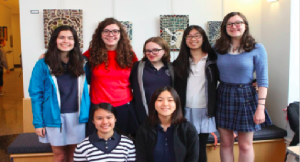Michael Bai ’20:
Writing, in addition to the visual and performing arts, is another art form through which Episcopal students can express themselves. EA’s student writers are passionate aspiring writers who have developed their craft through the opportunities that Episcopal offers.
For these students, writing is an easy and powerful form of self-expression. Phoebe Barr ‘19, who published a Cappies review in the Philadelphia Inquirer, says, “I have a lot of ideas in my head, and it’s really hard to keep them in there. I feel this urge to get them out on the page.” She continues, “I don’t know what I would do if I wasn’t writing. I enjoy it a whole lot, and I would not enjoy my life as much if I wasn’t doing it.” Fellow writer Zach Zebrowitz ‘19 shares a similar view, saying, “It’s a great outlet for things. At times, I don’t think you’re able to tell people your issues, so writing is a great release. I also like putting things in ways that haven’t been seen before.”
Competition also motivates EA’s student writers. As Mary Cipperman ‘21 explains, “I love to participate in writing competitions and challenges. For example, I’m working on a novel for Nanowrimo [National Novel Writing Month], and the other participants both in and outside of EA provide constant motivation for me. Writing competitions also challenge me to put forth my best work.”
Episcopal has a variety of options to help writers hone their skills. Christopher McCreary, US English Teacher and Faculty Advisor of the Creative Writing Club, says, “We have a semester-long creative writing workshop that people in tenth, eleventh, or twelfth grade can take. Some semesters focus more on fiction or poetry, some more on memoir or creative non-fiction. Because it shifts every semester, people can take it more than once if they’d like to.” He also says, “Creative Writing Club tends to be a lot more informal and more of a writing support group, usually with quick writing prompts that people work on for a few minutes and then share what they wrote. It’s pretty loose and just a fun thing.”
Oftentimes, what students begin writing in the club “becomes something bigger or longer or springs to life elsewhere,” McCreary continues. “There are a couple of people working on novels, for instance, that they started long before the school year. It’s a chance to talk to other interested writers about how that’s going. Hopefully, that gives them a support network to keep going.”
Many writers highlight the support and opportunities Episcopal has given them for their writing, especially the Creative Writing elective and the Creative Writing Club. McCreary mentions that “there is a range of things student writers can do. There are things like the Scholastic Art and Writing Awards. There is also Epolitan, Episcopal’s own yearly magazine of student writing and art. That’s a really easy place for students to submit their writing.” Trisha Tsundupalli ‘21 says, “As I reached Upper School, I found that Scholium was a great opportunity to write for a purpose. I am also a member of the Creative Writing Club, which consists of many unique individuals with amazing writing abilities.” Furthermore, Georgia Morgan ‘18 adds, “The Creative Writing class with Mr. McCreary is really good. He always gives structure to everything, but he also allows us to write in our own styles. There’s also Creative Writing Club, and there’s the GOA Poetry and Writing course, where you get to meet people around the world who are also into writing.”
Olivia Cipperman ‘19, recipient of two honorary mentions in the Scholastic Art and Writing Awards, says, “I’ve taken the creative writing class at EA with Mr. McCreary, and that really helped me develop my skills as a writer in crafting short stories and poems. Additionally, EA’s Creative Writing Club has become a big motivator for me over the past few years, and now I get to lead it and connect with other student writers on a regular basis. EA definitely has resources for young writers that have allowed me to grow personally and explore my own writing in a broader community context.”